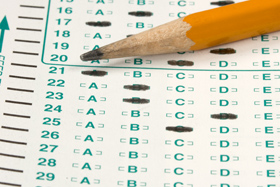ABA Standards Review Committee to Offer Two Alternate Approaches to LSAT Requirement

Image from Shutterstock.
An ABA committee has tentatively agreed on two alternative approaches to the current requirement in the Standards and Rules of Procedure for Approval of Law Schools that all law school applicants must take a valid and reliable admissions test.
The first approach would keep a pared-down version of the current requirement in the standards. The second would eliminate the requirement altogether.
Neither vote, taken during a Friday meeting of the Section of Legal Education and Admissions to the Bar’s Standards Review Committee, was binding. But the two votes taken together reflect a deep division among committee members over whether such a requirement is necessary, an issue over which the committee has gone back and forth several times already.
The existing standard (PDF), known as the LSAT requirement, says that a law school must require each first-year applicant to take a valid and reliable admissions test to assist the school and the applicant in assessing the applicant’s capability of successfully completing the school’s education program.
But the committee, which is working on a comprehensive overhaul of the standards, voted for second time last year to omit that requirement from its current draft. Not because there’s anything wrong with the test itself, which has proven to be a reliable predictor of a first-year student’s performance, but because the standard doesn’t require schools to give any particular weight to a student’s test score in its admissions decisions.
Those who want to do away with the requirement note that the ABA has already granted variances to several schools that have allowed them to admit a limited number of students who haven’t taken the LSAT. They also point out that no other accrediting agency requires schools to make students take an admissions test.
“It ought to be up to the schools to decide who they want to admit, and based on what factors,” says committee member David Yellen, dean of Loyola University Chicago School of Law. Yellen also says it doesn’t make sense to keep a requirement in the standards that is slowly being “chiseled away” through variances.
But those who want to keep the requirement say the test scores offer useful consumer information. They also say that grades are a very unreliable indicator of a law student’s success.
“I think this is absolutely fundamental to the quality of a legal education in America,” says committee member James Hanks Jr., a partner with the Venable firm in Baltimore.
On Friday, the committee, which has acquired several new members since its last vote on the matter, took up the issue yet again, first voting to approve a pared-down version of the current standard, then voting to forward to the section’s governing council an alternative proposal that would do away with the LSAT requirement.
The committee, which met Friday and Saturday in St. Louis, had initially planned to discuss its proposed changes to five of the standards’ seven chapters. But it hadn’t even gotten through the first two chapters when the meeting was adjourned.
Committee chair Jeffrey Lewis, dean emeritus and professor at St. Louis University School of Law, said afterward he wasn’t troubled by the slow pace of the committee’s deliberations.
“The goal is to do it right,” not to speed through it, he said, “and that’s exactly what we’re doing.”
Write a letter to the editor, share a story tip or update, or report an error.


